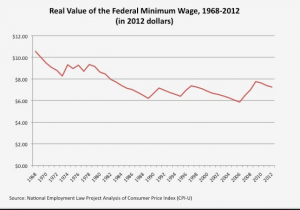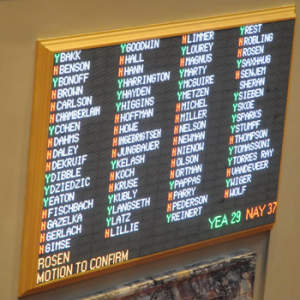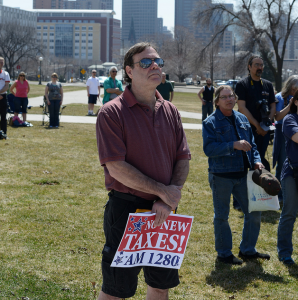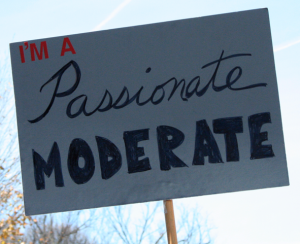Because journalists believe their audiences won’t tolerate nuance and ambiguity, they recruit political analysts who are certain, clear and decisive over those who are unsure, equivocal and astraddle. As a result, a kind of Punditry Darwinism plays out, where only the cocksure survive to deliver a steady stream of provocative instant analysis informed by little to no evidence.
MNsure’s Premature Death Proclamation
Take MNsure, Minnesota’s fledgling online tool for comparing and buying health insurance. When MNsure enrollment started slowly in its first month, Minnesota’s conservative talk radio pundits immediately declared it a train wreck, and this instant analysis has dominated the coverage to date.
MNsure may ultimately be a train wreck. After all, covering uninsured Americans has always been a very difficult task. But the immediate post-launch period is not a sensible time to make that judgment.
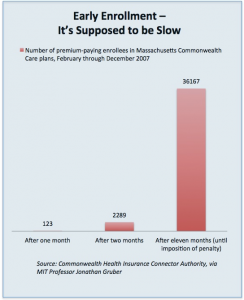 Historical data shows that consumers don’t tend to purchase health insurance the way they purchase Xbox 360s, lined up outside the store on launch day. Quite the opposite, most consumers purchase insurance at the very last moment possible. Purchasing an expensive service that you hope to never use is just not very satisfying, so most of us procrastinate.
Historical data shows that consumers don’t tend to purchase health insurance the way they purchase Xbox 360s, lined up outside the store on launch day. Quite the opposite, most consumers purchase insurance at the very last moment possible. Purchasing an expensive service that you hope to never use is just not very satisfying, so most of us procrastinate.
I’m not pulling this assertion out of my pundit posterior. In Massachusetts, just 123 early adapters stepped forward during their first month, and it didn’t get much better the second month. Instead, the big rush came just prior to the open enrollment deadline, when people face the prospect of a missed deadline and financial penalty.
It turns out that pulling the plug on the Massachusetts exchange when it only had 123 customers would not have been a wise decision for Commonwealth citizens, because Romneycare ultimately was worth the wait. After a few years of growing pains, Massachusetts’ Obamacare-like reforms increased the ranks of the insured to 97%. This puts states like Minnesota (91% insured) to shame, not to mention Chris Christie’s New Jersey (84% insured) or Ted Cruz’s Texas (76% insured).
Declaring a trainwreck just as a new train is lurching out of the depot is ludicrous. As much as it pains the cognoscenti, at this stage they need to be saying the four little words that might get them deleted out of reporters’ speed dials – “I don’t know yet.”
Daytonomics The Winner Already?
Then there is the Minnesota-Wiscoonsin border battle over state fiscal policy. In a New York Times commentary piece that has been widely shared via social media, a University of Minnesota professor and pundit recently declared that Minnesota Governor Mark Dayton’s Keynesian approach to state fiscal policy has been more successful than Wisconsin Governor Scott Walker’s austerity approach. His conclusion:
“The lesson from the upper Midwest is that rigid anti-tax dogma fails to deliver a convincing optimistic vision that widens economic opportunity and security.”
To his credit, the University of Minnesota professor does include caveats, such as “firm answers will require more time and more data.” But in the rush to be a clear and certain pundit who can get past the New York Times gatekeepers, the professor ultimately declared Daytononomics triumphant.
Here’s the problem with that: Daytonomics is very much in its infancy. Most of Governor Dayton’s most progressive policies are only now being put into effect, so the state of Minnesota’s economy can’t yet be attributed to the Daytonomics.
It’s true that Dayton has been in office for three years now. But, with the exception of Dayton’s expansion of Medicaid to 95,000 uninsured Minnesotans, the lion’s share of his progressive agenda — the improvements to education and other government services funded by tax increases on the wealthy — passed just a few months ago, after the 2011-2012 GOP-controlled Legislature was vanquished and could no longer block Dayton’s progressive policies.
Just as President Obama could not be fairly blamed for the 2008-2009 economic meltdown that played out before he could put his policies into place, Governor Dayton cannot be fairly celebrated for a better-than-average state economy when most of his progressive policies are only now being put into place. As a liberal, I hope Daytonomics bests Walkernomics, and expect it will. But it’s much too early to declare a winner.
As a public relations guy, I understand why the media wants commentators who give their audience instant gratification through instant analysis. But as a citizen, I worry about what all of this instant gratification does to us.
Psychologists find that children who can’t learn to delay gratification at an early age are much less likely to succeed in later life. The research indicates that the ability to delay gratification is absolutely key for success in school, marriages, friendships, health and jobs. The young kids who can’t learn to stop themselves from consuming marshmallows become the adults who can’t stop themselves from consuming the adult versions of marshmallows.
Given that research, what kind of democracy will we become if journalists, pundits and voters can’t learn to wait to make policy judgements until evidence is available to inform our debates?
– Loveland
Note: This post was also featured in MinnPost and Politics in Minnesota’s Best of the Blogs.


